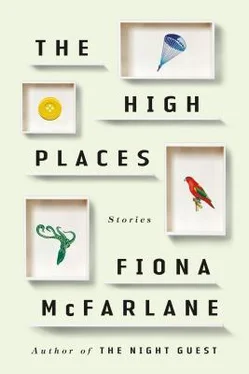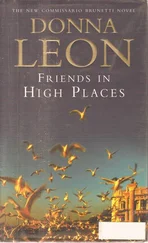With the help of the children, Cara carried the dishes to the kitchen. The greasy fishy paper curled in fantastic shapes on the floor beside the rubbish bin and flower cuttings littered the table. Cara washed and Cass dried. The other children wandered in and out — into the lounge room, where the adults drank and talked, and Rachel leaned into Adam on the couch; into the kitchen, where Cara clattered in the sink, where Cass might snap them with a tea towel; out into the garden, where the snails crawled on silver paths, until Cara told them again to stop banging the door. The adults made drowsy, wistful talk. Rachel lifted her arms to push the hair out of her face and her children heard the jangle of gold bracelets. The younger ones tiptoed in and volunteered for goodnight kisses, which they received from Adam and the woman in the electric-blue hat — Rachel blew kisses from the palm of her hand. Cara made the children brush their teeth before bed. She closed their bedroom doors herself. The candles were slugs of light curled in the bottom of the tins and the tablecloth was sticky wherever the chilli sauce had touched it. The guests called: Leave the table, Cara. Come and sit down, said the woman in the blue hat. Her hair was tightly curled, she wore yellow stockings. How old are you, Cara? she asked. Only fourteen? She looks older, don’t you agree? Adam agreed, and Rachel smiled with a yawn. Someone had brought a tray of pastries from the Greek café. Cara spilled icing sugar on the carpet, it didn’t matter. The children slept. Adam moved his thumb over Rachel’s forearm, up and down and slowly. The Christmas lights above his head were a crown of stars. Cara, shy, laughed when the adults did. One of them wanted to smoke. You don’t mind, Cara, do you? It isn’t cigarettes. Cara shook her head. Nobody told her to leave, but she went to bed. Now that Adam had moved in, Cara was the only person in the house to have her own bedroom. Outside, the palm trees shrugged and struggled in the wind. That was Saturday night.
* * *
They lived in a low wide white weatherboard house in a Greek part of Sydney, right next to an Orthodox church. On Sunday mornings the noise of chanting men rolled out over the ripe garden. Under the sound of it, Cara lifted a blue shirt against the clothesline and pegged it in place: now there were five Adam shirts floating on the line. She lay in the grass beneath them. It was November; the fierce magpie mothers were nesting in the gums and an ibis stood sentry in every palm. Cara thought Rachel looked like an ibis: long-legged, with a black curve of hair along the neck. Rachel and Adam were in bed. Every Sunday morning: in bed. All the children had shooed themselves from the house. The yellow bedroom curtains remained shut; the house was sweet, white, forbidding. Marcus and Elsa hunted lizards, Wallis stripped bark from a tree, Cass kicked at a ball. Cara lay curled in the sun with an arm across her face. She was too tall, with a rushed vertical look and no chest or hips to speak of. And black hair like her mother’s. She curled to hide her height.
The children began to complain, as they did every week. ‘We’re hungry,’ they said, not so much to Cara as to each other.
‘Cass, go in, get us something to eat,’ said Wallis. Wally knew she was named for a king’s girlfriend and liked to issue commands.
‘Shit no,’ said Cass, pleasant and slow, kicking his ball.
Cara lifted her arms above her head. A high laugh came from the house, which was worse than silence. Wallis sat on Cara’s legs; Elsa came through the garden and collapsed over Cara’s flat front. Cara could summon the girls like that, only by lifting her arms. Not the boys — but who cared? They only yelled all day and had a weird kicking way of walking. She used to love them blindly, with a vicious loyalty, but when Adam came she saw him size them up, laugh, and shake his head; then she knew their deficiencies. Sometimes she copied Adam’s way of reaching out to mess their hair — a soft skating cuff to the rough backs of their heads that made them duck and grin when he did it. With her they only scowled.
‘Cara,’ said Wally, and Elsa said it too. ‘Cara Cara Cara,’ they chanted, and slapped their small hands against her feet and legs.
‘How long will it be?’ asked Wallis. ‘It’s hot out here. Is it hot?’
Cara wanted only to lie still and feel the sun and think about the church, which was white with a dome and a blue cross, and palm trees and ibises, so that it might be somewhere in the Mediterranean, and if that were true then Cara might be, also, somewhere on a foreign sea, maybe older, maybe beautiful, Cara mia. If Adam was out here, she thought, he would put Elsa in the laundry basket, or Marcus, and lift them high over his head. They would shriek and laugh and tumble into the grass. Then Adam would go away from them, from the garden and the house, to walk around the block and smoke. Rachel had told him never to smoke in front of the children. Cara thought of Adam smoking, the way his forearm looked as he lifted the cigarette to his mouth, the particular tense muscle that clenched in his golden jaw. She shivered in the grass. Wallis caught Cara’s shiver and hugged herself.
The singing quietened down next door. The doorbell was ringing — on a Sunday? And who ever rang the doorbell? The postman with a special package, Cara’s teacher the time she visited, men in suits who wanted to save everybody from hell. Didn’t they all know: Don’t make noise on a Sunday, not on a Sunday morning, and not with the doorbell, a real brass bell (brought back from India, from the neck of a sacred cow dripping with flowers, or from Switzerland maybe, a healthy Swiss cow in a high mountain pasture), so loud it could wake the dead. Cara lunged up from the grass so that Wally and Elsa slid and tumbled. She hurried around the side of the house, where weeks ago Cass had drawn a penis in blue chalk. The children followed. Who was at the front door, waking the dead? A girl with brown hair, a small wheeled suitcase, and an enormous belly. A pregnant girl. Cara pulled at the hem of her short blue dress. The other children pressed behind her, except for Cassidy, who was eleven. He slouched against the fence, pretending indifference. The church opened up behind him and people milled about.
‘Hi,’ said the girl, and Cara said, ‘Can I help you?’
Oh, the girl didn’t seem to know. She let go of her suitcase and began to cry. The crying made her red face redder, her hair damper, and there were rings of sweat under her arms and on the yellow T-shirt that stretched so far over her stomach; the rainbow on the T-shirt was twisted and wide.
‘Is this where Adam lives?’ asked the girl, and because she said his name — this was how it seemed to Cara — Adam opened the front door. He stood there for a moment wearing only a pair of shorts, his hair in all directions. Then he stepped outside and held the girl — his arms were long enough to reach around her, despite her belly, and she pressed her face into his chest with her hands knotted under her chin, crying, crying, until all the children ran away and only Cara saw him kiss the stringy top of the girl’s damp head.
Adam smiled at Cara after giving the kiss.
‘This is my sister,’ he said, and the girl lifted her swollen face. ‘This is Danny. And Danny, this is Cara.’
Cara could see in Danny’s soggy smile that she was more happy than sad; or that her sadness, now that she had been held in Adam’s arms, was complicated by joy. So Cara felt savage and said, ‘Does Mum know?’
Adam only laughed and stepped back from Danny, which made him disappear into the house. Danny followed. Cara pulled the suitcase behind them as quietly as she could. She eased the front door closed. The door to Rachel’s room was still shut, sealed by Sunday; Danny seemed to know to lower her voice. Adam didn’t, but his voice was never loud, although it carried. In the night and on Sunday mornings it carried and carried.
Читать дальше












